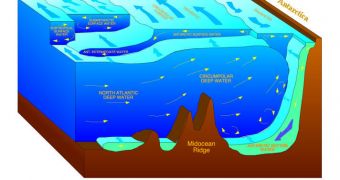Marine experts and oceanographers believe that a monitoring network to cover all of the world's oceans should have been set into place years ago,and is therefore long overdue.
Such a sensor network could be used to keep track of all the changes that take place in the global waters, such as for example how reefs develop, how many species roam the seas, and how salinity and water acidity change over time.
A large surveillance array could be used to observe even more traits, such as circulation, water cycle and so on. But the main issue now is getting such a network started, since none is yet available.
Though it may seem like an unjustifiable expense at first, producing a monitoring grid could help us better prepare against the effects of global warming and climate change.
The world's waters began changing massively several hundred years ago. Natural variations have existed since the dawn of time, but the ones currently being recorded are way off the charts.
Past studies have demonstrated that the level of acidity in the global ocean has increased by more than 30 percent since 1800, and that most of that increase has been taking place over the past 50 years.
In addition to bleaching and killing corals, ocean acidification also affects phytoplankton and other small marine creatures, which form the basis of the intricate food webs of the oceans.
Such impact could have far reaching and long-term consequences, but thus far experts have set up no network to study those effects in an integrated manner.
Some of the things that can be influenced by the changes include marine life patterns, water temperature levels, the sea level itself, as well as the polar ice cover, Our Amazing Planet reports.
“Most ocean experts believe the future ocean will be saltier, hotter, more acidic and less diverse. It is past time to get serious about measuring what's happening to the seas around us,” says Jesse Ausubel.
The expert is one of the founders of the Census of Marine Life (CML), the recently-ended, decade-long research initiative to assess the biodiversity of the world's oceans.
Ausubel was also one of the scientists who initiated the oceanography group that will now urge governments to start monitoring the seas. The collaboration is called the Partnership for Observation of the Global Oceans (POGO).
“Ocean acidification could have a devastating effect on calcifying organisms, and perhaps marine ecosystems as a whole, and we need global monitoring to provide timely information on trends and fluxes from the tropics to the poles,” says POGO expert Peter Burkill.
“International cooperation is desperately needed to complete a global ocean observation system that could continuously collect, synthesize and interpret data critical to a wide variety of human needs,” adds POGO chairman Kiyoshi Suyehiro.

 14 DAY TRIAL //
14 DAY TRIAL //